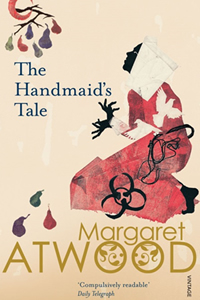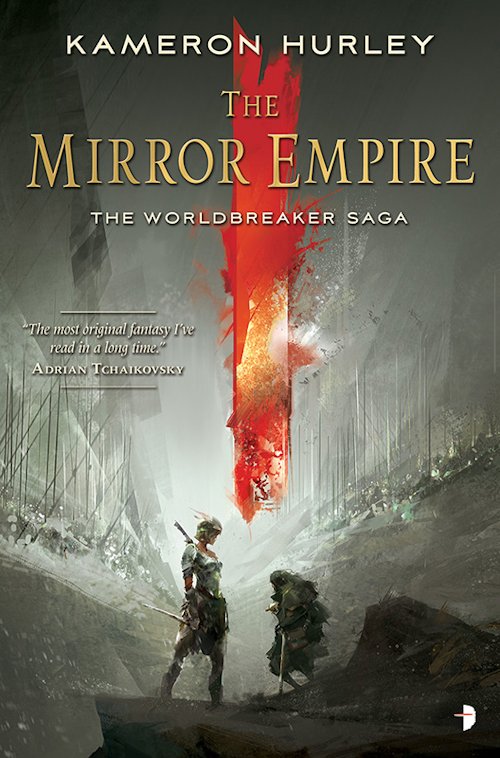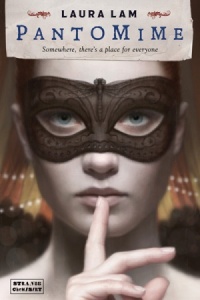Welcome back to the British Genre Fiction Focus, Tor.com’s regular round-up of book news from the United Kingdom’s thriving speculative fiction industry.
This past week, the Amazon Editors put their heads together and published a “bucket list of books to create a well-read life.” A guide for the Game of Thrones generation, according to one critic. But that’s music to our ears, right readers?
Later on, in Cover Art Corner, The Mirror Empire by Kameron Hurley looks magnificent… if distinctly different. And in Odds and Sods, Chris Beckett explains how a green screen inspired Dark Eden, Cassandra Clare says something that’ll probably prove controversial, meanwhile a Murder Most Magical is about to happen.
A Bucket List of Books
“So many books, so little time,” begins the Amazon Editors’ introduction to the list of literature they lately collated—a statement that speaks loudly and clearly to me, and to most of you too, I’m sure. With this in mind, then:
The Amazon Books Editors set out to compile a list of 100 Books to Read in a Lifetime, as our colleagues across the pond did a few months ago. We wanted the list to cover all stages of a life (which is why you’ll find children’s books in here), and we didn’t want the list to feel like homework. We also chose to not include plays or poems in our list, at least this time round. Of course, no such list can be comprehensive—our lives, we hope, are long and varied—but we debated and came up with a list, our list, of favourites.
And quite the list it is! Though some critics have complained in any case. In The Guardian, Robert McCrum appeared unhappy that “these are guides for the Game of Thrones generation,” and perhaps they are.
Speculative fiction—and fiction of interest to speculative fiction fans—figured in to the Amazon Editors’ bucket list of books in every category, in fact. In Children’s Books, The Worst Witch, The Enchanted Wood, and Charlie and the Chocolate Factory all made the cut. Recommend Young Adult efforts featured Harry Potter and the Philosopher’s Stone, Noughts & Crosses, and the first Artemis Fowl.
The Hound of the Baskervilles, Frankenstein, and Wuthering Heights were amongst the Classics selected by the Amazon Editors, and in the Something More Modern section, we have The Wasp Factory by Iain Banks and Norwegian Wood by Haruki Murakami.
In Contemporary Fiction, behold The Road by Cormac McCarthy, Never Let Me Go by Kazuo Ishiguro, and The Girl with the Dragon Tattoo, too. The Twentieth Century Classics category included Rebecca by Daphne du Maurier and Nineteen Eighty-Four by George Orwell, and in Nonfiction Essentials we find A Brief History of Time, Bad Science, and The Selfish Gene.

As if genre fiction weren’t already relatively well represented, in addition to all of the books above, Amazon’s literary list dedicated an entire category to Alternative Worlds, featuring ten texts in the following order: The Fellowship of the Ring, American Gods, The Handmaid’s Tale, The Stand, The Time Machine, The Colour of Magic, Watchmen, The Hitchhiker’s Guide to the Galaxy, Do Androids Dream of Electric Sheep? and A Game of Thrones. Because of course.
All told, almost a third of the literature selected by the Amazon Editors falls within the speculative fiction descriptor: a very generous representation of the genre that pleased me a great deal. Others, as aforementioned, enjoyed it lots less. In a piece comparing the British bucket list of books with its American counterpart, Robert McCrum concluded that:
…these are only lists, and 100 titles is a tough call, but as a vision of a future literary library it’s scarcely an inspiring prospect. It would be easy to raise the cry of “our literature in danger” and/or “dumbing down starts here.” But perhaps what these lists tell us is that, in this cultural snapshot, the UK is always likely to play Greece to America’s Rome—and that, in any month of the year, posterity is the cruellest critic, as well as the most capricious.
Well, whatever. I liked the list. To a greater or lesser extent, I think it does what it says on the tin. It certainly did genre fiction justice, and that kind of recognition remains a rarity.
There’s room for some audience participation, too, if there’s anything you think the Amazon Editors missed.
Me, I was sorry not to see any Diana Wynne Jones; I wonder why Artemis Fowl made the cut when The Hunger Games didn’t. I’m surprised that the Editors in question selected American Gods rather than The Ocean at the End of the Lane to represent Neil Gaiman; likewise, I’d have loved to see some Guy Gavriel Kay, because it doesn’t get better; and some urban fantasy, because it’s a large part of the landscape, like it or lump it. Last but not least, with The Handmaid’s Tale the only one of the ten Alternative Worlds texts written by a woman, a more representative selection in said section especially would have been welcome.
But that’s what the GoodReads Readers’ Picks list is for. Go forth and cast your votes, folks!
Cover Art Corner: Mirror, Mirror
With Infidel only recently released here in the UK, and still no word as regards Rapture—the final volume of the Bel Dame Apocrypha novels—my hunger for Kameron Hurley’s work is no laughing matter. Luckily, the author of God’s War has a brand new novel out not too long from now: The Mirror Empire will be published worldwide on August 26.
We’ve blurbed it in the course of the British Genre Fiction Focus before, in Invisible Women for the Win, and we needn’t repeat ourselves this week. Instead, we have some stunning cover art by Richard Anderson to ogle:

The art marks rather a departure from the covers for the Bel Dame Apocrypha books, albeit an “apt” departure, according to the author. And why’s that?
…because The Mirror Empire is a huge departure from my previous books—still subversive and a little dark, sure—but far more solidly over in the epic fantasy category, with huge stakes, blood mages, genocide, flesh-eating plants, and… unexpected social dynamics. What I really dug about this cover was that it very clearly conveys exactly what the book is—a shadowy epic fantasy with world-shattering stakes.
[…]
Writing a book where giant rifts open between worlds, I worried that the cover art would deliver a World of Warcraft-style portal. But Richard’s vision here—of a literal vertical wound between the worlds—was extraordinary. And thematically spot on.
The Worldbreaker Saga begins in three months, readers. I can only hope you’re half as excited about it as I am. Hurley’s track record suggests that The Mirror Empire could be one of the year’s best books, and having read a little of it already… that is a distinct possibility.
Odds and Sods
-
 Pantomime has been named the Book of the Month for teens and younger readers by the Scottish Book Trust. Congrats to Laura Lam.
Pantomime has been named the Book of the Month for teens and younger readers by the Scottish Book Trust. Congrats to Laura Lam.
- Chris Beckett talks about the story behind the story of his Arthur C. Clarke Award-winning novel Dark Eden on Upcoming4me: “There’s an alchemy about the genesis of a book or a short story. You need several different elements—the shining trees, the idea of transgression, the Adam and Eve story, the idea of a stone circle as a symbol of tradition—but you also need some sort of spark. […] My shining forest probably started out as shining green letters on a computer screen.” Ha! I remember them well.
- HarperCollins have had a good year, I gather. “The greater efficiencies we’ve introduced into the business this fiscal, with the new warehouse system now running at full strength and other backroom savings, have all helped drive improvements in profit.” CEO Charlie Redmayne also acknowledges that the success of genre fiction authors such as George R. R. Martin and Veronica Roth, whose Divergent series has sold in excess of 600,000 units in the UK alone, has played a part in that.
- Tor UK has shown off the lovely new cover of The Rithmatist by Brandon Sanderson… but you knew that already, right?
- With Mark Smith, the Chief Executive of Quercus, going, going, gone, David North has been appointed Managing Director of the struggling publisher, which was bought, as you’ll recall, by Hodder & Stoughton. Still no idea what that means for its genre fiction imprint, Jo Fletcher Books, but you’ll know as soon as I do.
- Mortal Instruments author Cassandra Clare has said that “the UK is much more welcoming than the US of gay and bisexual characters in teen novels.” I don’t know if that’s true—I just report the news.
- Plans for this Friday? Cancel them. “Murder Most Magical features three of of the biggest names in crime/fantasy: alongside Ben [Aaronovitch], Paul Cornell and Jasper Fforde will be in conversation courtesy of BristolCon” at the local Waterstones. Sounds like a night to remember, right?
Niall Alexander is an extra-curricular English teacher who reads and writes about all things weird and wonderful for The Speculative Scotsman, Strange Horizons, and Tor.com. He’s been known to tweet, twoo.









